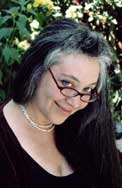|
Commentary
and Collaborations from the Actors’ Training Project ·
for the integration of Acting, Voice and Movement ·
at the intersection
of the classical and the avant-garde Lissa
Tyler Renaud, PhD |
|
October 2001 Letter
Changing
Values: The Who & How of Voice Training
The editor of a
local publication recently posed a question to the community at large: “Have
your values changed?” Although the question did not initially capture my imagination,
I found that it took hold and wouldn’t budge till I’d given it serious thought.
Indeed, my sense of what is worthwhile or valuable in the voice training
profession has changed dramatically over more than twenty years--both in terms
of Who and How.
I grew up acutely aware of the power of heightened language delivered well.
Early on, I understood that people in the theatre, for example, had a
responsibility to speak beautifully and expressively, and I knew that they
trained hard to be able to make those sounds I loved to hear. I also knew
that audiences listened with special scrutiny to the voices in film, television
and radio‹and that people in those fields also had to “practice, practice,
practice” to achieve the clarity and variety that we listeners found so
appealing to hear. I came to think of these as “the speaking
professions,” and both studied and taught in these
special--specialized--fields.
Over the years, though, I began to recognize that same heightened sound of
language in more and more general contexts. I heard the theatre’s rounded
diction and rhythmic delivery in good political speeches, in religious sermons;
I heard it at official school functions and over loudspeakers at sports events.
In short, in any situation where people wanted to give importance to what they
were saying, they used a more or less consciously “theatrical” style of speech.
Ultimately I see that people with dynamic voices seem to gravitate to the top
of any field they are in. Whether I am choosing a president, a doctor, a
babysitter or a car mechanic, I will always avoid someone with a tense or
strange voice, and feel drawn to someone who uses his or her voice well. If
people like to listen to your voice, they will come back to it--bringing money,
trust, friendship. Now I believe that the quality of our voices plays a
profound role in the overall quality of our lives. The Who for whom splendid
speech habits are important is not only a Who on the theatrical or world
stage--it is you.
There is a second major change in what I find of “value” in my profession,
related to how our speech is trained. Some of my early voice training left me
with the notion that the voice was a Mechanical Thing that lived inside me and
which I had to learn how to use--rather like a car I had to learn to drive or a
new appliance I had to plug in safely. Now I know that the voice is a living,
ever-shifting Litmus Test for the health and well-being of each individual;
that the voice’s health is a function of the freedom in our breathing and the
harmony between our bones and muscles. Therefore, the How of educating the
voice is not like training “the little man inside the radio”; it is like
expanding our breathing to include our whole bodies, like learning a philosophy
of the body that supports the whole voice.
© 2001 Lissa Tyler Renaud. All rights reserved. Please share this text—including copyright information—with interested private parties and for educational purposes. Please refer people who would like to be on (or off) the mailing list for this and/or future mailings. But please contact me for permission before you reproduce, translate, transmit, frame or store this in a retrieval system for public use: acttrainproj@earthlink.net. Thank you for your consideration. LTR/ATP
|
Please
contact me if you would like to receive the text of my previous column in
this series: Making Actors: A
Paean to the Acting Journal
March
2001 Open
Correspondence with Chandradasan: Thiyyam's "Uttar-Priyadarshi"
February
2001 George Stillman
House: Towards a Profession Worthy of Serious Consideration
October
2000 Among the
Mangos: Thoughts in Memoriam
September
2000 Talent Under
Scrutiny: The Focus Point
August
2000 Actors’ Training
Project: A Recital
July
2000 Towards a
Philosophy of the Breath: Selected Journal Notes
June
2000 A Life, Not a
Letter: For Sir John Gielgud
May
2000 Paying
Attention: The Tension in Intention
May
2000 KANDINSKY:
Dramatist, Dramaturg and Demiurge of the Theatre
April
2000 |
